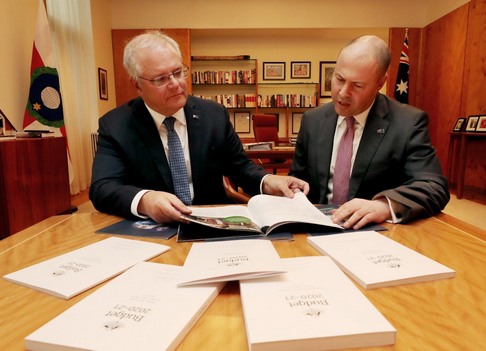The Australian Federal Government will invest $328 million to grow the nation's food and fibre exports, as part of the 2020 Budget, announced on Tuesday night.
Minister for Agriculture, David Littleproud, says it is part of the Economic Recovery Plan, aimed at driving jobs and economic growth, cementing agriculture’s role in the nation’s COVID-19 recovery. The Australian agriculture industry is aiming to become a $100 billion industry by 2030, from $61 billion currently.
“Agricultural exports are critical to Australia’s economic recovery. That’s why this Budget is delivering the $328 million 'Busting Congestion for Agricultural Exporters Package',” Minister Littleproud said. “This suite of reforms will modernise Australia’s export systems by slashing red-tape and streamlining regulation and service delivery for our farmers. We’re making it faster and cheaper for farmers to get their product to market, while retaining the levels of quality and assurance that have made our exports world-class.”
Included in the package; $222.2 million over 4 years for digital services to help take produce to market. This will hopefully deliver a modern and reliable digital service to help farmers do business quickly and cost-effectively through a single touchpoint for exporters that is available 24/7.
In addition, $10 million will be spent over 4 years for removing congestion for plant export industries; streamlining border clearances for plant exports by reducing manual processes and improving service times and cost savings for exporters. While there is also $71.1 million over 3 years for Australian services to ensure products make it to export markets.
"These investments form part of our Ag 2030 Plan, supporting industry to grow Australian agriculture to a $100 billion by 2030 through modern export systems,” he said. “These investments will accelerate innovation and agricultural trade growth, build a resilient and agile agriculture sector and create jobs in rural and regional Australia.”
The Australian Fresh Produce Alliance (AFPA) welcomed the 2020-21 Budget, which it says provides a range of key measures to support the continued recovery and growth of the Australian fresh produce sector. Particularly, temporary tax incentives, which will allow businesses to deduct the full cost of eligible depreciable assets of any value in the year they are installed; the cost of improvements to existing eligible assets made during this period can also be fully deducted.
“Increasing investment in capital equipment is a key part of the economic recovery and the continued growth of Australian agriculture. This budget measure allows growers to invest in their business and set themselves up for growth,” AFPA CEO, Michael Rogers said.
In addition, the AFPA supports the $317.1 million to extend the International Freight Assistance Mechanism until the middle of next year, which Mr Rogers says will support Australian farmers by ensuring they can get their high-quality produce into key export markets and that they stay connected with their overseas customers.
“The International Freight Assistance Mechanism has been a key part of ensuring that Australian fruit and vegetable exporters are able to continue sending Australia’s high-quality produce overseas and supporting jobs and growth in regional communities. The extension of funding will ensure that Australian summerfruit, cherries and table grapes will continue to be exported this season,” he said.
Australian Treasurer Josh Frydenberg delivered the budget, announcing the overall underlying cash balance is now expected to be a deficit of $213.7 billion in 2020-21, but is confident that the budget is expected to improve over the forward estimates to an expected deficit of $66.9billion in 2023-24.

Prime Minister Scott Morrison and Treasurer Josh Frydenberg looking at the budget before it was delivered in Parliament (Source: Scott Morrison Twitter)
The COVID-19 pandemic has also severely impacted the seasonal agricultural workforce, posing major challenges for the 2020-21 summer harvest. Mr Littleproud says through the Budget, the Australian Government is investing $17.4 million in relocation assistance and $16.3 million to incentivise young Australians to take up farm work by temporarily changing Youth Allowance (student) and ABSTUDY independence eligibility criteria.
The National Farmers' Federation notes the horticulture industry is expected to have a labour deficit of 26,000 workers come March 2021, and will continue to call for a designated workforce solution to address agriculture's ongoing labour challenges.
"We welcome the investment to see Australians pursue careers in agriculture with support to make higher education courses in agriculture more affordable," NFF President Fiona Simson said. "In what is arguably the most important Budget of a generation, Treasurer Josh Frydenberg has outlined a pragmatic but bold spending agenda that will accelerate agriculture’s growth and regional Australia’s contribution to the nation’s bottom line. The NFF welcomes a combination of big-ticket, future-focused regional infrastructure spends and immediate cash injections needed to stimulate growth and to address the COVID-induced challenges facing farmers, including critical labour shortages."
Meanwhile, Minister for Resources, Water and Northern Australia, Keith Pitt, says the government is boosting support for farmers by providing an additional $50 million to extend the On-Farm Emergency Water Infrastructure Rebate Scheme.
"This scheme has provided real assistance to some of our hardest-hit farmers by helping them install new water infrastructure and I am pleased we can work with the states to continue helping them,” he said.
For more information on the Busting Congestion for Agricultural Exporters Package: click here
To access full budget papers: click here
